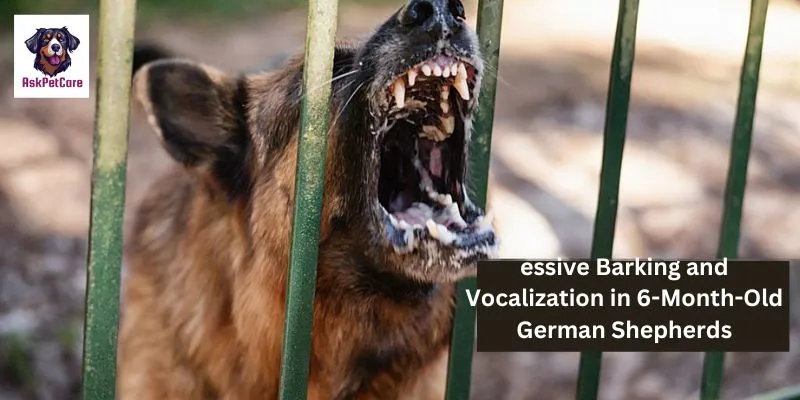Hello, dog lovers today we explore the reasons for Excessive barking and vocalization in 6-month-old German Shepherds. If you’ve got a German Shepherd pup, you know how smart and full of energy they are! But sometimes, they bark a lot, especially when they become 6 months old. Understanding why they bark so much and finding ways to deal with it can help you and your pup get along better.
German Shepherds are known for being super smart and loyal, but sometimes they bark too much. Here’s why and what you can do about it:

Hello everyone who loves dogs! I’m Dr. Arif Aziz, and I’ve been taking care of pets especially dogs at my clinic for a long time, exactly 14 years! I’m here to share some valuable information with you that I’ve gathered from books during my study time written by experts in veterinary medicine (DVM) and MSC (Master of Science), as well as from my own experiences working with dogs. I’ve been running my Veterinary Clinic for the past 14 years… for more information visit my site at www.askpetcare.com
Excessive Barking and Vocalization In 6-Month-Old German Shepherds, Step By Step
| topic | Simple Explanation |
| Understanding the Nature of German Shepherds | German Shepherds bark a lot because they’re protective and like to let others know they’re around. |
| Identifying Triggers and Fundamental Causes | German Shepherds bark more when they’re bored, scared, protecting their territory, or looking for attention. |
| Implementing Positive Support Training | You can teach your German Shepherd not to bark too much by giving them treats and praise when they’re quiet. You can also give them toys and activities to keep them busy. |
| Looking for Professional Guidance and Support | If your dog keeps barking too much, a professional dog trainer can help. |
Understanding the Instinctive Nature of German Shepherds
German Shepherds are renowned for their protective natures and strong vocalization bents. Historically bred as herding and working dogs, they often rely on barking as a means of communication and protecting their territory. At 6 months old, your German Shepherd may exhibit heightened alertness and a desire to declare their presence, which can be apparent through excessive barking.

Identifying Stimulates and Underlying Causes of Barking.
Excessive barking in German Shepherds can be caused by various factors, including:
- Territorial Behavior: German Shepherds are known for their strong territorial instincts. They may bark to alert others to their presence and protect their territory.
- Alerting: German Shepherds have a keen sense of awareness and may bark to alert their owners to potential threats or unusual activities in their environment.
- Attention-Seeking: Like many dogs, German Shepherds may bark to seek attention from their owners or to communicate their needs, such as the need for food, water, or playtime.
- Separation Anxiety: German Shepherds are known for forming strong bonds with their owners, and they may bark excessively when left alone due to separation anxiety.
- Boredom: Lack of mental and physical stimulation can lead to boredom in German Shepherds, prompting them to bark out of frustration or restlessness.
- Socialization Issues: German Shepherds that have not been properly socialized may bark in response to unfamiliar people, animals, or situations.
- Fear or Anxiety: German Shepherds may bark when they feel fearful or anxious about specific stimuli, such as loud noises, unfamiliar environments, or new experiences.
- Medical Issues: In some cases, barking may be a symptom of underlying medical issues such as pain, discomfort, or cognitive decline. It’s essential to rule out medical causes if your German Shepherd’s barking patterns change suddenly or persistently.
- Reactive Barking: German Shepherds may bark in response to other dogs barking or to environmental stimuli such as sirens, fireworks, or thunderstorms.
- Unwanted Behavior Reinforcement: If barking is inadvertently rewarded by the owner with attention or treats, the behavior may become reinforced, leading to continued barking in various situations.
- Understanding the underlying causes of barking in German Shepherds can help address the behavior effectively through appropriate training, management, and environmental enrichment.
- Sure, here’s a simple table listing ten causes of barking in German Shepherds:
|
|
|
|
|
|
|
|
|
|
|
These are common reasons why German Shepherds may bark, and understanding them can help in managing and addressing the behavior.

My related topics
what-is-a-german-shepherds-favorite-food
exploring-the-anatomy-of-a-dogs-claw
Why-did-my-African-Gray-Suddenly-start-screaming
Vocalization in dogs
Vocalization in dogs refers to the various sounds they make to communicate with humans and other animals. Dogs use vocalization as a way to express their emotions, needs, and intentions. Here are some common forms of vocalization in dogs:
Barking: Barking is the most common form of vocalization in dogs. They bark to alert their owners to potential threats, express excitement, seek attention, or communicate their emotions such as fear or frustration.
Howling: Howling is another form of vocalization used by dogs, often as a means of long-distance communication. Dogs may howl in response to sirens, other dogs’ howls, or when they feel lonely or anxious.
Whining: Dogs may whine to express discomfort, pain, or anxiety. They may also whine to seek attention, such as when they want to go outside or receive a treat.

Growling: Growling is a warning vocalization used by dogs to communicate aggression or discomfort. Dogs may growl when they feel threatened, cornered, or when they want to assert dominance.
Baying: Baying is a deep, prolonged vocalization typically associated with hound breeds. Dogs may bay when tracking prey or during hunting activities.
Yelping: Yelping is a high-pitched vocalization that dogs use to express pain, surprise, or fear. Dogs may yelp if they are injured, startled, or in distress.
Grumbling: Some dogs may emit low, dull sounds as a form of communication. Grumbling can indicate gladness, relaxation, or mild displeasure.
Understanding the different forms of vocalization in dogs can help pet owners understand their dog’s behavior and respond suitably to their needs and emotions
Implementing Positive Reinforcement Training.

Effective training techniques can help address excessive barking and vocalization in your 6-month-old German Shepherd:
- Socialization: Introduce your puppy to various people, animals, and environments from an early age to help them feel more comfortable and confident in different situations.
- Obedience training: Teach your puppy basic commands such as “quiet” or “speak” using positive reinforcement methods like treats, praise, and consistency.
- Desensitization: Gradually expose your German Shepherd to stimuli that activate excessive barking, such as strangers or loud noises, while rewarding calm behavior.
- Enrichment activities: Provide your puppy with interactive toys, puzzle feeders, and mental challenges to keep their mind engaged and prevent boredom-related barking.
Seeking Professional Guidance and Support
. If you’re having trouble stopping your German Shepherd puppy from barking too much, get help from a professional dog trainer. They can watch your puppy’s behavior and make a plan to train them better. Remember, excessive barking is normal for young German Shepherds, but with patience and the right training, you can help them learn. If things don’t improve, don’t worry. A trainer can help you figure out what to do. With time and training, your puppy can become a well-behaved part of your family’s.
frequently asked questions.
- What are common causes of excessive barking in 6-month-old German Shepherds?
- Separation anxiety, lack of stimulation, and territorial behavior.
- How can owners address excessive barking in their 6-month-old German Shepherds?
- Through positive reinforcement training, socialization, and providing mental stimulation
- .When should owners consider seeking professional help for excessive barking in their German Shepherd puppies?
- If their efforts at training are ineffective, if the barking persists, or if the behavior poses challenges to the household.
Here are some reference books that are considered authoritative on the topic of dog care, including nail care:
- “The Complete Dog Owner’s Manual” by Dr. Bruce Fogle
- “The Ultimate Guide to Dog Care: Everything You Need to Know to Keep Your Dog Happy and Healthy” by Amy Marder and Andrew Luescher
3. “The Veterinarians’ Guide to Natural Remedies for Dogs: Safe and Effective Alternative Treatments and Healing Techniques from the Nations Top by Martin Zucker
